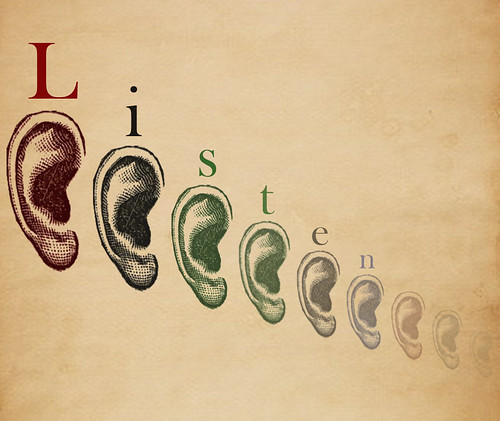Engaging in Listening
"Listen" (CC BY 2.0) by ky_olsen
Listening and it’s Techniques
Introduction
In this article, efforts are made to expose you to a very important skill that is needed in the school and that is listening to oral teachings delivered. In your situation, what you are being trained for is the ability to listen attentively, follow a teaching that is delivered orally and a respond to activities after the lecture. No doubt, you need significant skills that you must develop in order to make a success of your studies at the school and life in general.
As we all know, listening is an important day to day activity. A person who can not listen Lives a Life of a fool and unintelligent and thus cannot be what a speaker is saying. It is useless to listen and not comprehend.
A general fault of many people, even the highly placed is to pretend to listen and comprehend what people are saying, while they do not. Some people always want to talk and too proud to listen. The aim of this article is not to make you such a person.
We shall discuss the following in this article:
a. Necessary skills of listening
b. Listening techniques
c. Factors hampering listening comprehension
d. How to increase your comprehension rate
A. Necessary Listening- Comprehension Skills
i. Ability to listen and comprehend spoken English in both academic and non academic situations.
ii. Another skill very important in teachings is the ability to work out the intention of the speaker.
The skill to determine the lectures' intention is very important in listening to academic lectures. You feel completely defeated when you are unable to determine the purpose or the intention of a levy.
iii. You also need to develop a sense of critical analysis and evaluation of what you hear from lectures. You should be able to differentiate between facts and opinions, discriminate and predict outcomes of lectures. Only a poor student absorbs all that is given to him in the form of lecture.
iv. You need, very much, the skill of adapting to different speech styles, speech rates of a speaker of different linguistic background.
v. And finally, you need the skill of note-taking from lectures.
B. Listening- Comprehension Techniques
Techniques that a student must posses are:
i. A functioning ear: without an ear that functions very well, it is rather difficult for you to listen and comprehend lecture. If you are a student with hearing problem, purchase a hearing aid or sit in the front of the hall or class.
ii. Concentration: ability to comprehend the lecture you have listened to depends very much on the concentration you put into the lecture. To concentrate you must not do think of any other thing than the lecture you are listening to. You should look at the speaker the majority of the time. Think along with him as he delivers the lecture. Note-taking of the major points of the Lecture also enhances concentration. Without concentration, you will not get much from the lectures.
iii. Thinking along with the speaker: One way to enhance your listening- comprehension ability is to always think along the speaker as he delivers the lecture. One way to think along with the speaker is to put yourself in his position. Imagine that he is talking to you alone and that you are beside him. Note what he has just said, anticipate what he is about to say, relate what he has said before with what he is saying now and what he is going to say next.
C. Factors Hampering Listening Comprehension
From what you have read so far, it is possible to identify the following factors that can hamper active listening comprehension process:
i. Lack of concentration
ii. Distraction and disturbances
iii. Interference of another thought into the main thought
iv. Faulty speech habit of the speaker
v. Unfamiliar sentence patterns used by the speaker
vi. Difficult vocabulary item by the teacher
vii. Listeners interest, intrigue motivation etc
The more you are able to control these factors, the better your listening comprehension ability. It means , therefore that you should try to widen your knowledge of the Language so as to minimize the Hampering comprehension defects that may hamper this ability.
D. Increasing your Comprehension Rate
If you want to increase your comprehension rate, you are advised to:
i. Listen attentively to what the speaker is saying
ii. Follow the speaker as he is speaking
iii. Have a wide range of vocabulary items enough to understand what is being said
iv. Recognize common speech patterns that a speaker can use
• Introduction- a brief statement about what the speaker is going to say
• The body of speech which is often divided into main points and supporting details
• The conclusion which summarizes the speech and establishes the speakers' stand.
• Recognize various speech signals which points to the main point (e.g firstly, secondly etc) or show a shift of emphasis in speech patterns.
• Learn to deduce unfamiliar words and expression in the speech from it’s context
• Be interested in what the speaker is saying and be involved in note-taking activities, i.e putting down the major points which are raised in the speech.

Comments